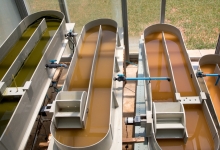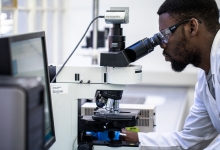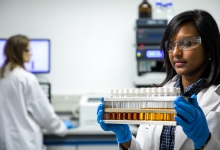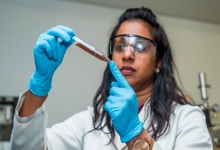Bioprocessing Technologies
The CSIR’s bioprocessing technologies team focuses on the development of disruptive bio-based technologies and products for integration into existing industries or for the establishment of new bio-based small, micro and medium enterprises (SMMEs).
Bioprocess engineering is a specialisation of chemical engineering. It entails the design and development of equipment and processes for the manufacturing of biologically based products for use in agricultural products, food, feed, pharmaceuticals and nutraceuticals; the chemicals and construction industry; as well as for municipal and industrial wastewater treatment. Expertise in this field is a combination of knowledge rooted in biotechnology, microbiology, molecular biology and engineering. Bioprocess development scientists develop production processes for biologically based products of interest, using organisms such as yeast, fungi, bacteria, algae, viruses and mammalian cells.
The bioprocess development group establishes new technologies that utilise natural by-products or renewable feed stocks from the agricultural and industrial sectors. The group’s mission is to create sustainable and exciting new technologies that have the potential to be commercialised by existing SMMEs and big industry, or to even lead the creation of new companies, thereby continually contributing to the growth of the South African bio-economy.
This research group hosts three platform technologies, namely bio-conversions, bio-based products and biomanufacturing.
Bio-conversions platform
This platform entails the development of sustainable biological processes for the production of a host of bio-based platform chemicals, such as bio-alcohols, and lactic and succinic acids, among others, using various feedstocks. In this area, waste substrates may be used as raw materials to develop techno-economically feasible novel bioprocesses for bio-based chemicals and bio-polymer production in South Africa. Traditionally, chemicals, polymers and fuel have been produced from conventional fossil fuel-derived processes. Global concerns over depleting fossil fuel reserves and climate change have prompted the growth and development of the bio-based economy, and finding alternatives to conventional petrochemical production processes and technologies. Bio-based chemicals may be used in several industries, including biofuels, pharmaceuticals, personal care products and cosmetics, packaging, plastics, cleaning products, detergents, adhesives, pigments and dyes, lubricants, paints and coatings, agrochemicals, inks, as well as intermediates for chemical production.
Bio-based products platform
This technology platform focuses on developing processes for the production of new bio-materials at scale. Technology development is undertaken to produce a portfolio of bio-based products that can be tailored to address a particular application.
Sectors of application include:
- Agro-chemicals – anti-fungals, bio-pesticides, bio-stimulants and sustainable bio-based alternatives to traditional agro-chemicals.
- Food and feed ingredients – probiotics for animal and human health and starter microbial cultures.
- Industrial products – bio-surfactants, bio-lubricants and bio-stabilisers (comprising bio-enzymes and bio-polymers).
- Recombinant replacements or metabolites – chemozymes, growth factors, enzymes and more.
- Novel bio-based products – polyethylene terephthalate (PET) degrading bacteria.
- Synthetic and industrial biology – upscaling bench scale technologies, which involves the use of recombinant or genetically modified organisms as production hosts for the manufacture of speciality compounds such as novel insulin growth factor and interferon-α products.
Bio-manufacturing platform
The bioprocess development team is proficient in developing technologies from 10 to 1000 L scale and offers contract manufacturing services for the production of biological material on request. Key competencies include product and process development, product formulation, system design and implementation, method development and analytical testing, microbiological synthesis and testing, drafting of Standard Operating Procedures, installation and commissioning of equipment, operation of bioreactors, operation of analytical equipment (such as gas chromatography, high-performance liquid chromatography and protein purification equipment) cost models and feasibility assessments.
The CSIR’s South Africa-based, globally competitive laboratories are available for the development of bioprocessing technologies. The laboratories include:
- Microbiology laboratories;
- Fermentation laboratories equipped with 10, 30, 200, and 1 000 L scale bioreactors;
- Wet processing areas, including large-scale centrifuge for biomass separation;
- Dry-product processing areas;
- Protein purification laboratories;
- Downstream piloting laboratories (for distillation, evaporation and extraction); and
- Analytical laboratory (gas chromatography and high-performance liquid chromatography).






